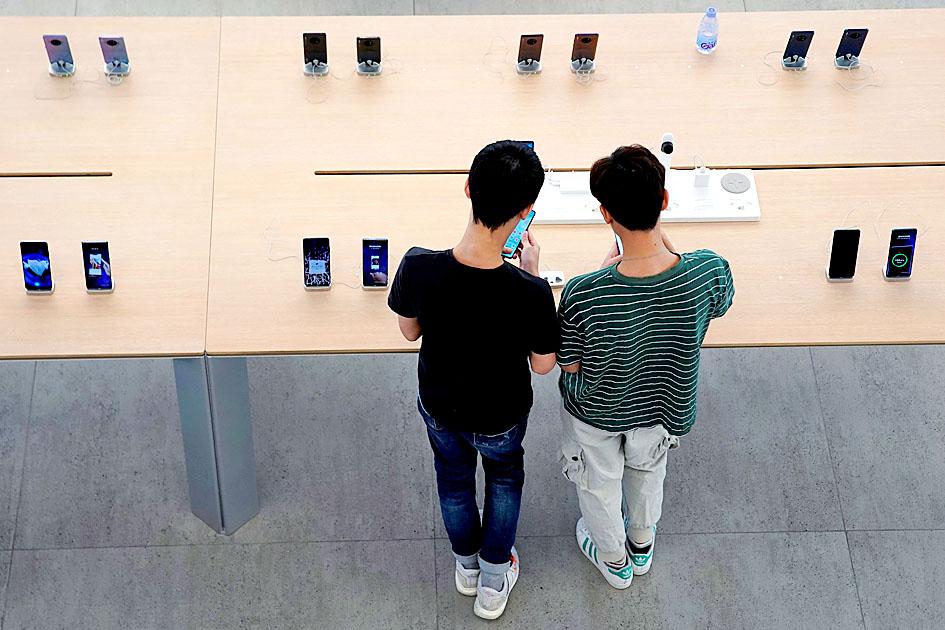Chinese tech giant Huawei Technologies Co (華為) yesterday said that it would launch a long-awaited new operating system for smartphones next week, part of an all-out push into the software industry aimed at overcoming US sanctions and taking on Google’s Android.
Huawei tipped the launch of its HarmonyOS platform, set for Wednesday next week, in a short teaser on social media, just as an internal memo came to light in which company founder and chief executive officer Ren Zhengfei (任正非) outlined plans to go big in software.
The 76-year-old assured staff that “in the software domain, the US will have very little control over our future development, and we have much autonomy.”

Photo: Reuters
Huawei’s plans are the latest signs of a radical transformation at the Shenzhen-based company, which is moving quickly into new product lines seen as less vulnerable to US pressure and a re-focus on its core domestic market.
Analysts warn that creating a successful new mobile operating system is exceedingly difficult in a world where Android and iOS are firmly entrenched, and the launch will be watched closely by the tech world.
Huawei gave no further details on the launch other than the timing.
A move into software is prudent for Huawei, which remains years away from developing chips needed for its own devices, IRT Corp chief analyst Marc Einstein said in Tokyo.
The timing is also good because the advent of 5G networks in years to come would radically change the tech landscape, offering major new opportunities in artificial intelligence, wired “smart cities,” intelligent vehicles and other tech spheres.
“Some of these things are still very, very early days and there’s no real gorilla in the market yet,” Einstein said. “So it does make sense to go in this direction.”
Einstein said that while Huawei’s size and expertise would make it formidable, success is not assured.
It would need to compete against domestic tech giants such as Alibaba Group Holding Ltd (阿里巴巴), Tencent Holdings Ltd (騰訊) and Baidu Inc (百度), which have all pushed into software and cloud computing, and the US-imposed hurdles overseas could curb its appeal in foreign markets, he said.

BYPASSING CHINA TARIFFS: In the first five months of this year, Foxconn sent US$4.4bn of iPhones to the US from India, compared with US$3.7bn in the whole of last year Nearly all the iPhones exported by Foxconn Technology Group (富士康科技集團) from India went to the US between March and last month, customs data showed, far above last year’s average of 50 percent and a clear sign of Apple Inc’s efforts to bypass high US tariffs imposed on China. The numbers, being reported by Reuters for the first time, show that Apple has realigned its India exports to almost exclusively serve the US market, when previously the devices were more widely distributed to nations including the Netherlands and the Czech Republic. During March to last month, Foxconn, known as Hon Hai Precision Industry

Taiwan Semiconductor Manufacturing Co (TSMC, 台積電) and the University of Tokyo (UTokyo) yesterday announced the launch of the TSMC-UTokyo Lab to promote advanced semiconductor research, education and talent development. The lab is TSMC’s first laboratory collaboration with a university outside Taiwan, the company said in a statement. The lab would leverage “the extensive knowledge, experience, and creativity” of both institutions, the company said. It is located in the Asano Section of UTokyo’s Hongo, Tokyo, campus and would be managed by UTokyo faculty, guided by directors from UTokyo and TSMC, the company said. TSMC began working with UTokyo in 2019, resulting in 21 research projects,

Ashton Hall’s morning routine involves dunking his head in iced Saratoga Spring Water. For the company that sells the bottled water — Hall’s brand of choice for drinking, brushing his teeth and submerging himself — that is fantastic news. “We’re so thankful to this incredible fitness influencer called Ashton Hall,” Saratoga owner Primo Brands Corp’s CEO Robbert Rietbroek said on an earnings call after Hall’s morning routine video went viral. “He really helped put our brand on the map.” Primo Brands, which was not affiliated with Hall when he made his video, is among the increasing number of companies benefiting from influencer

Quanta Computer Inc (廣達) chairman Barry Lam (林百里) yesterday expressed a downbeat view about the prospects of humanoid robots, given high manufacturing costs and a lack of target customers. Despite rising demand and high expectations for humanoid robots, high research-and-development costs and uncertain profitability remain major concerns, Lam told reporters following the company’s annual shareholders’ meeting in Taoyuan. “Since it seems a bit unworthy to use such high-cost robots to do household chores, I believe robots designed for specific purposes would be more valuable and present a better business opportunity,” Lam said Instead of investing in humanoid robots, Quanta has opted to invest